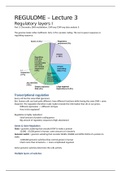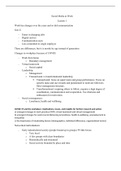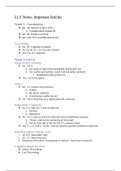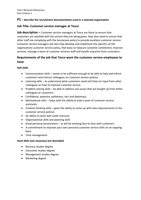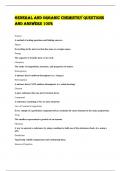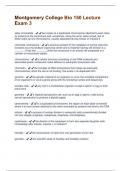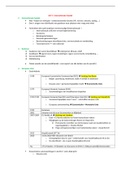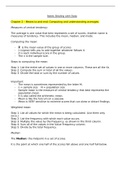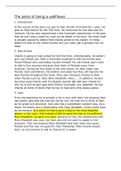MOTOR CONTROL IN GENERAL – CLASSIFICATIONS
Skill classified by Task Organization
Descrete skill classification is identified by the following:
- Has a definite beginning and end
- Usually starts and ends quickly
Examples: throwing, kicking, playing video games, and many more sport skills
(jumping, catching)
Serial skill classification is identified by the following:
- Contains several discrete skill connected together in a sequence to
perform critical movement patterns
- Order of sequence is crucial to successful performance
- Usually requires a longer time than discrete skills
- Progresses from an individual focus to a combined focus with lots of
practice
- Becomes like one single smooth rapid movement over time
Examples: driving a manual car, brushing teeth, hammering a nail, and many
sport skills (gymnastic routine, following the sequential gates during a downhill
ski race)
Continuous skill classification is identified by the following:
- Skill unfolds without a recognizable beginning and end in an ongoing
fashion
- Action continues for many minutes
- Skill is often repetitive of rhythmic in nature
- Duration is usually determined by a marker or barrier (e.g., wall of finish
line)
Examples: swimming, running, and skating
Skill classified by the Relative Importance of Motor and Cognitive
Elements
Motor skill classification is identified by the following:
- Places emphasis on the quality of movement that makes the skill
succesful (e.g., high jumper clearing a bar)
- Emphasis is placed on correct performance
- Decision making is minimized
- Motor performance maximized
Cognitive skill classification is identified by the following:
- Cognitive nature of the movement is less important to performance
than the actual decision making or strategy guiding the movement
(e.g., chess)
- Emphasis is placed on what to do
- Decision making is maximized
- Motor control is minimized
Most skills are a combination of motor and cognitive (e.g., playing
quarterback, driving a car, or walking in a busy area to get to class).
,Typically, new skills require a great deal more cognition (thinking) than a
skill performed by an elite performer.
Skills classified by Environmental Predictability
The environment may be stable and predictable (closed skill) or unstable
and unpredictable (open skill).
Open skill is a skill that is performed in an environment that is variable
and unpredictable. That means the performer must be ready to adapt his
or her movement in response to changing environmental conditions, as is
the case when playing a point in tennis, driving a car in heavy traffic,
defending a fast break in basketball, wrestling, and hitting a ground
stroke.
It also fits the following:
- Must use perception and decision making to adjust movement
- Has a short time to adjust
- Have changing environmental conditions
- Difficult to predict the future moves of others
Closed skill is performed in an environment that is stable and
predictable. That means the performer can focus more on producing the
movement, as is the case in sports such as golf, bowling, and gymnastics.
It also fits the following:
- Can advance or organize movement without being rushed
- Requires little adjustment
In case of a closed skill one could say that the environment is ready and
‘waiting’ for the performer to start his movements. The performer
estimates the timing/onset/start of the action. That’s why these kinds of
tasks are called self-paced skills.
When an open skill is the case than the performer must react, time and
adjust his action exactly to the action of the object (which is moving in
space) or the characteristics of the environment (an escalator is rolling) or
the actions of an other performer (a teammate is running away from his
opponent). That is why these kinds of skills are called externally paced
skills.
Environmental demands include the degree to which the environment is
stationary of in motion (“regulatory variability”) and the extend to
which the environment changes from one performance attempt to the
next (“context variability”). Regulatory conditions for closed skills are
stationary (hitting a golf ball), whereas those for open skills are in motion
(hitting a baseball). Regulatory variability for closed skills generally is
minimal, whereas that for open skills is considerable.
Skills classified by Skills Action requirements
Action requirements means the requirement of the movement itself.
,Low requirements of the movement itself means no changes from
moment tot moment: no body transport and no object manipulation (i.e.
standing hill).
High requirements means the body moves and an object is manipulated
(like walking in a shop and pushing a shopping trolley).
Some examples:
- If you play golf, the ball is patiently waiting on a Tee until you are
ready to make that hole in one (fewer variables). The body of the
hitter and the ball remain stationary
- If it is your turn to knock off at playing billiards (in a fixed formation
and on a flat surface with a constant temperature), the playing balls
are waiting for you to be accelerated by you
- On the other hand if you watch baseball and the pitcher is throwing
at the batter, the pitcher each time wants to throw in a different
way to deceive the batter
Classification according to Gentile
Both dimensions, environmental demands, and action requirements from
part of the Gentile’s two dimensional classification system for Physical
Therapy Settings.
The first dimension is similar to the open-closed classification system
which is described above and refers to the degree to which the
environment is stable or varies from movement and performance
to performance.
The second dimension deals with the requirements of the movement
itself, i.e. the degree of body transport and object manipulation.
A skill with lower demands for both dimensions would be performed in a
predictable environment with few movement requirements, such as
drinking a glass of water at the same kitchen table.
A high-demand skill would be one performed in an unpredictable
environment with higher movement demands, such as white-water
canoeing.
Other examples of classifications:
1. The amount of complexity
- Simple motor task
- Plural motor tasks
o Coupling of the same movements (successively)
o Coupling of different movements (successively)
o Coupling of two motor skills at the same time (simultatiously)
o Motor skill coupled with cognitive tasks (double task)
o Motor skill coupled with another motor skill and a cognitive
skill = plural motor skill combined with a double task
2. Symmetrical movements or alternating movements
, 3. Skills classified by the precision of movements: fine motor
and gross motor movements
Week 1 – Introduction Task Motor Control (notes from class)
Duchenne = waggelgang
Motor control involves coordinating muscles and movements to perform
tasks
It is essential for learning new skills, improving performance, and
rehabilitation in pediatric physical therapy.
Classification of Motor Skills
Motor skills are often classified based on environmental demands
- It’s all about predictability!
Open tasks don’t have a discrete beginning or end and the environment is
constantly changing so you have to adjust to the environment
Closed skills
- Defenition: skills performed in a stable, predictable environment
where the performer decides when to start the action
- Characteristics:
o Consistent performance conditions
o Minimal environmental changes
Open skills
- Defenition: skills performed in a dynamic, unpredictable
environment where timing is often externally dictated
- Characteristics:
o Requires adaptability to environmental changes
o It often involves decision-making and quick responses
Closed to (more) open tasks
1. Throw the ball
2. Throw the ball to someone
3. Throw the ball to someone that is moving
4. Throw the ball to someone when you are both moving
5. Trefbal
Closed to (more) open tasks


